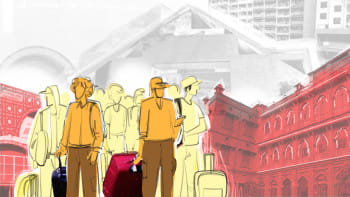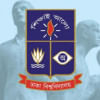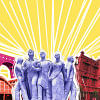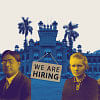Disincentives for Dhaka University teachers

When I joined a private university after I graduated from Dhaka University (DU), I used to get a good salary. I worked there for about two years and a half. Then I joined DU but for one-third of the salary I got at my previous job. It is peculiar that DU tries to recruit high-quality candidates but provides poor salaries. The salary of a university lecturer does not differ significantly from that of a college lecturer. But their quality is not same.
Living on the monthly salary from DU's was really difficult for me. I had to use my previous savings to manage a newly married life. Thankfully, I had an alternative to increase my income by teaching courses at the private university where I previously worked. I could only maintain a decent life with the additional earnings from the private university.
However, most of DU teachers do not have the opportunity to earn extra income. Some teachers used to teach in English medium schools for extra earnings. After private universities were established, many DU teacher started teaching there as adjunct faculties which reduced their financial constraint partially.
In order to increase the earnings, several faculties and institutes at DU opened evening programmes. But not all programmes have equal demands, plus junior teachers often have relatively fewer opportunity to take courses in evening programmes. Meanwhile teachers of the departments that do not have evening programmes cannot earn any extra money.
Taking the opportunity of this low salary, the university authority has created some positions—more like traps for teachers—which are allocated based on political affiliation. As a result, the teachers are made subservient to partisan politics. A house tutor, for instance, gets allowance, pays lower house rent and uses their experience as house tutor for promotion. Similarly, a good number of sub-standard apartments whose rent is considerably low are also allotted by and large politically. This way a large section of teachers gets involved in university politics to reduce financial constraints.
Because of low salaries, many teachers have already left this university. The recent trend indicates that many teachers who went abroad for higher studies did not come back. In some departments, nearly half of the teachers did not return after finishing their PhD degree.
The university does not have incentives for those who have excellent academic backgrounds. For instance, a professor with a doctorate from Harvard University gets the same salary as a professor with no additional degree but who was promoted just because of his/her length of service. Moreover, there is no incentive for publishing research articles in highly-ranked journals. An article published in any journal of Dhaka University is given the same weight as one published in an internationally reputed journal.
The low pay also demotivates some teachers to allocate much time to the university. They only come to the campus when they have classes. They do not even carry out rigorous research. Some even stop research after becoming a professor. Despite the low pay, a large percentage of teachers still engage in rigorous research and lend much time to the university. They regularly publish scholarly articles.
Teaching is a profession that demands mindfulness and continuous improvement through persistent effort. Hence it needs a certain salary without any comparison with other professions. If teachers cannot maintain a modest standard of living with their salary, they cannot be expected to produce an optimum level of intellectual output. With the present salary structure of Dhaka University teachers, it is very difficult to maintain a respectable life. Only a limited number of teachers who have the opportunity to earn additional income can raise their standard of living but with huge extra effort.
Living on the university campus is another source of disincentive. Teachers have to pay the full house rent although many apartments are ramshackle. A teacher has to repair an apartment to make it worthy of living and the university authority reimburses only a small part of it.
The salary structure of equivalent professions in the public sector is similar to that of Dhaka University teachers. But the public officials gets other perquisites such as car loans and car maintenance allowances. Besides, during the last regime, unbridled corruption made certain public sector jobs very lucrative and led to further income equality in society, especially among different groups of public sector job holders. Such inequality negatively impacts the personal lives of those who try to make an honest living including many public university teachers.
Therefore, public university teachers' salaries must be revised. Once it is revised, all teachers should be made accountable and they have to achieve their research target every year. The salary structure of DU can be estimated based on the average salary of its graduates. The average should be calculated by median which is not influenced by extreme values.
If the salary is not raised, DU will end up with average-quality teachers. Even if qualified teachers join this university with the current salary, they will get involved in multiple jobs for financial freedom. This will surely hamper the education quality of the university. There will be unhealthy competition among teachers. For example, teachers of some departments now compete with each other for exam invigilation to earn additional money.
When the issue of a separate pay scale for Dhaka University teachers is raised, it does not get proper attention. In the past, DU teachers were reproached by the heads of the government. At times, the government mentioned budgetary constraints as a barrier to solving the problem. However, we did not witness any shortage of money when the government bought expensive cars for public officials. Money becomes scarce only when the remuneration of teachers is asked to increase. Dhaka University teachers use minibuses and vans to commute, but other public officials are given individual cars to commute.
Dhaka university can increase its revenue to meet its own financial requirements. At present a student pays a monthly fee of Tk 30 only. The university can charge its students monthly fees based on their "ability to pay." Their parents' income should be taken as an indicator of their financial ability. By dividing the students into various income strata, differential fees may be charged. If this technique can be applied successfully, the university's revenue will certainly increase. Poor students too may be supported financially by the revenue earned by the university. However, finding the actual income of parents is a real challenge.
No government so far has shown adequate effort to solve this fundamental problem regarding the salary of teachers at this university. As is normal, a university with resource constraints poses fewer threats to the position of authority. Once the problem is fixed, teachers will be less dependent on partisan politics and have more room to be open-minded, free thinkers. They will be driven by reasoning and always challenge authority. It is not a scarcity of resources that keeps the problems unresolved; it is simply a lack of intention to solve these issues at all.
Dr Md Main Uddin is professor and former chairman of the Department of Banking and Insurance at the University of Dhaka. He can be reached at [email protected].
Views expressed in this article are the author's own.
Follow The Daily Star Opinion on Facebook for the latest opinions, commentaries and analyses by experts and professionals. To contribute your article or letter to The Daily Star Opinion, see our guidelines for submission.

 For all latest news, follow The Daily Star's Google News channel.
For all latest news, follow The Daily Star's Google News channel. 











Comments